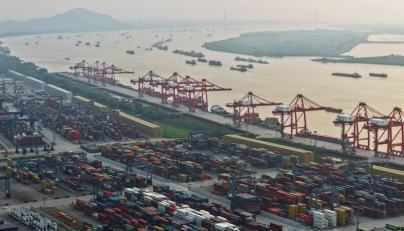Business
QNB Forecasts Growth in China’s Consumer Spending Amid Reforms

According to a recent report by QNB, private consumption in China is expected to continue its upward trajectory, driven by substantial savings, consumer-friendly policies, and significant reforms aimed at alleviating economic uncertainty for households. This outlook challenges the prevailing consensus among analysts, who may underestimate the potential of the Chinese consumer as a key growth engine.
Current Consumer Trends
The report highlights a notable slowdown in consumer spending during the second quarter of 2025, following a robust start to the year. Real growth in this sector has fallen to its lowest level since January, raising concerns among economists. Despite government initiatives to stimulate consumption, the household savings rate remains stable, indicating that changing long-standing financial habits poses a significant challenge.
Household consumption has long been viewed as a critical component missing from China’s economic framework, an issue not limited to short-term cyclical trends. While the government has initiated efforts to transition from an investment-led growth model to one focused on services and consumption, many analysts and policymakers still regard the persistent weakness in consumer spending as a major hurdle. This is particularly concerning in a nation with a population of 1.4 billion and increasing income levels.
The cautious approach of Chinese consumers is understandable, given the multiple economic disruptions they have faced, including the pandemic, a stagnating property market, and unpredictable policy shifts. Yet, QNB posits that there is a significant misunderstanding regarding the scale and importance of private consumption within the Chinese economy.
Significance of Household Savings
Data from the People’s Bank of China reveals that household deposits in the Chinese banking system surged from $11.8 trillion before the pandemic to $22.3 trillion by May 2025. This immense pool of savings could be mobilized to enhance consumption or investment in the medium term, contingent on improved consumer confidence. Such a shift could sustain consumption growth and increase its share of GDP.
Despite this potential, the report acknowledges the difficulty in achieving a significant rise in consumer spending. Chinese households generally adopt a cautious financial strategy and tend to save more, partly due to limited government social safety nets. However, even a slight reduction in the savings rate could lead to substantial increases in both consumption and investment, especially as the government gradually expands its social welfare programs.
Moreover, China is actively pursuing a rebalancing of its growth model away from heavy reliance on infrastructure investment. Recent policy initiatives have focused on enhancing advanced manufacturing sectors, such as electric vehicles and semiconductors, while also emphasizing the necessity of bolstering household demand. The government aims to raise the share of consumption in GDP from the current 40% to 50% by 2035, supported by social policies, housing assistance, and credit support for consumer finance.
Long-Term Economic Reforms
Finally, ongoing structural reforms in China are gradually transforming household perceptions of financial risk. Changes in the property sector, such as stricter mortgage regulations and efforts to reduce developer debt, are addressing market imbalances. Although these measures have temporarily slowed economic activity, they are essential for rebalancing household finances and minimizing systemic risks. In turn, this fosters a more stable consumption environment driven by enhanced consumer confidence.
In summary, while challenges remain, QNB’s report underscores the significant potential of private consumption in China. With the right policies and reforms, the Chinese consumer could play a pivotal role in the country’s economic future, driving growth in a landscape that is increasingly focused on domestic demand rather than external investment. As such, understanding and nurturing this potential will be crucial for sustained economic development in the years to come.
-

 World3 months ago
World3 months agoTest Your Knowledge: Take the Herald’s Afternoon Quiz Today
-

 Sports3 months ago
Sports3 months agoPM Faces Backlash from Fans During Netball Trophy Ceremony
-

 Lifestyle3 months ago
Lifestyle3 months agoDunedin Designers Win Top Award at Hokonui Fashion Event
-

 Sports3 months ago
Sports3 months agoLiam Lawson Launches New Era for Racing Bulls with Strong Start
-

 Lifestyle3 months ago
Lifestyle3 months agoDisney Fan Reveals Dress Code Tips for Park Visitors
-

 Health3 months ago
Health3 months agoWalking Faster Offers Major Health Benefits for Older Adults
-

 World3 months ago
World3 months agoCoalition Forms to Preserve Māori Wards in Hawke’s Bay
-

 Politics3 months ago
Politics3 months agoScots Rally with Humor and Music to Protest Trump’s Visit
-

 Top Stories3 months ago
Top Stories3 months agoUK and India Finalize Trade Deal to Boost Economic Ties
-

 Entertainment3 months ago
Entertainment3 months agoExperience the Excitement of ‘Chief of War’ in Oʻahu
-

 World3 months ago
World3 months agoHuntly Begins Water Pipe Flushing to Resolve Brown Water Issue
-

 Science3 months ago
Science3 months agoNew Interactive Map Reveals Wairarapa Valley’s Geological Secrets









